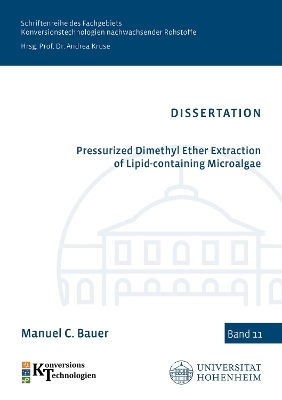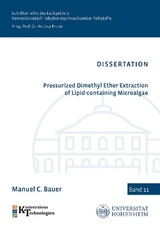Pressurized Dimethyl Ether Extraction of Lipid-containing Microalgae
Seiten
In contrast to classical, oleaginous biomasses, microalgae are usually characterized by an increased water content and a relatively simple, albeit very robust, structure. Both properties represent a significant challenge for established processes. Consequently, an alternative method for lipid extraction from microalgae was investigated in this work: Extraction with liquefied dimethyl ether (DME).
Therefore, the solvent properties of DME, known uses, and existing (regulatory) framework were examined in depth.
Batch extractions of four different freeze-dried microalgae (Arthrospira platensis, Nannochloropsis gaditana, Phaeodactylum tricornutum, and Scenedesmus almeriensis) were performed to assess the influence of algae pre-treatment and species on crude oil yields and fatty acid extraction with DME.
Follow-up experiments with P. tricornutum revealed that the water content of the biomass plays a crucial role in the extraction.
The presented work demonstrated that lipid extraction with liquefied DME is a promising unit operation for algae-biorefineries. In the case of P. tricornutum, energy consuming drying or alternative feedstock pretreatment is not required. This fundamental advantage could play a pivotal role for the competitiveness of microalgae-based production in the future.
Therefore, the solvent properties of DME, known uses, and existing (regulatory) framework were examined in depth.
Batch extractions of four different freeze-dried microalgae (Arthrospira platensis, Nannochloropsis gaditana, Phaeodactylum tricornutum, and Scenedesmus almeriensis) were performed to assess the influence of algae pre-treatment and species on crude oil yields and fatty acid extraction with DME.
Follow-up experiments with P. tricornutum revealed that the water content of the biomass plays a crucial role in the extraction.
The presented work demonstrated that lipid extraction with liquefied DME is a promising unit operation for algae-biorefineries. In the case of P. tricornutum, energy consuming drying or alternative feedstock pretreatment is not required. This fundamental advantage could play a pivotal role for the competitiveness of microalgae-based production in the future.
| Erscheinungsdatum | 04.02.2024 |
|---|---|
| Reihe/Serie | Schriftenreihe des Fachgebiets Konversionstechnologien nachwachsender Rohstoffe ; 11 |
| Verlagsort | Düren |
| Sprache | englisch |
| Maße | 148 x 210 mm |
| Gewicht | 248 g |
| Themenwelt | Naturwissenschaften ► Biologie ► Biochemie |
| Schlagworte | Bioeconomy • Biorefinery • DME • lipid extraction • pressurized liquid extraction |
| ISBN-10 | 3-8440-9364-8 / 3844093648 |
| ISBN-13 | 978-3-8440-9364-3 / 9783844093643 |
| Zustand | Neuware |
| Haben Sie eine Frage zum Produkt? |
Mehr entdecken
aus dem Bereich
aus dem Bereich




